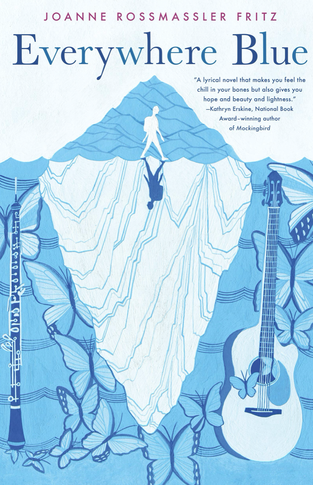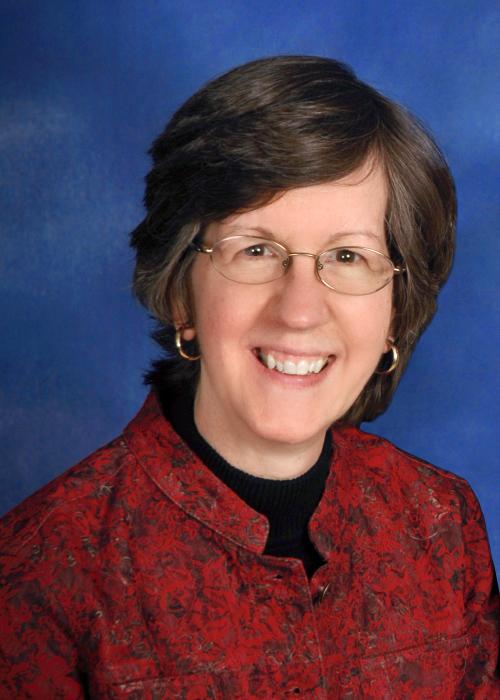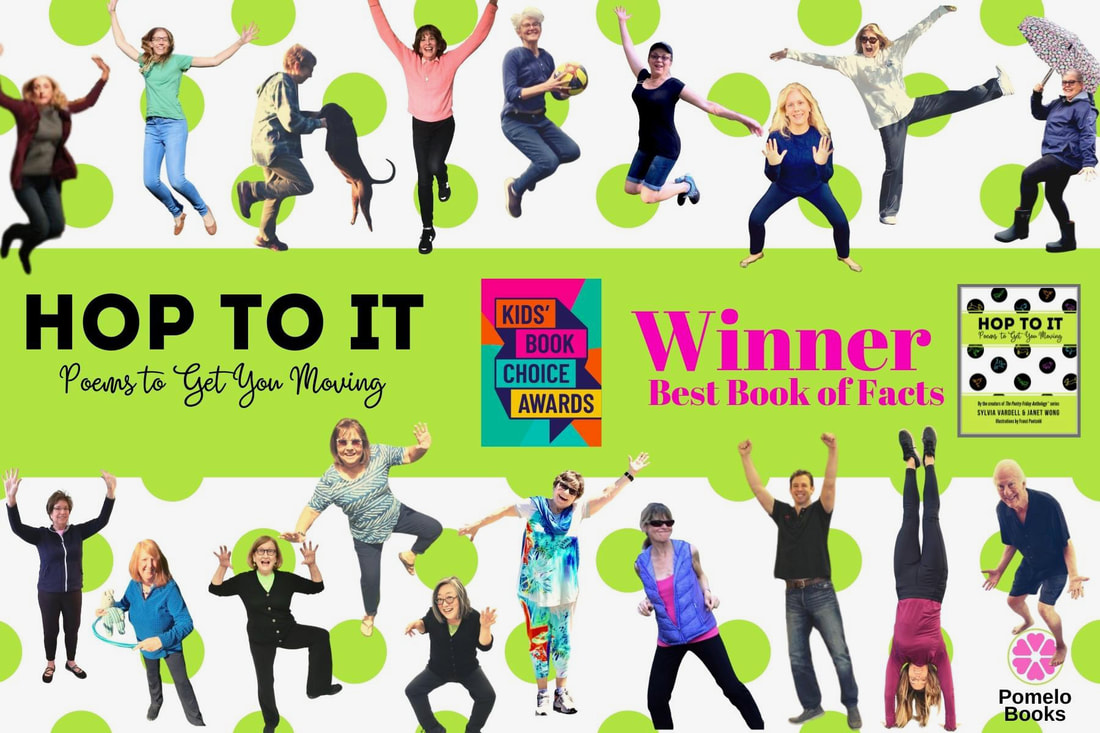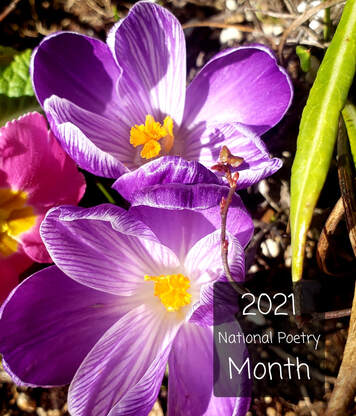 Welcome, welcome! Today all the poetry goodness of the world will be found at Catherine at Reading to the Core. It's my fifteenth year of participating (some years better than others). I have five great interviews lined up: April 2 POETRY FRIDAY: ALLAN WOLF April 9 POETRY FRIDAY: LISA FIPPS April 16 POETRY FRIDAY: CHRIS BARON April 23 POETRY FRIDAY: JOANNE ROSSMASSLER FRITZ April 30 POETRY FRIDAY: LITA JUDGE I love getting books into the hands of readers so there will be prizes for stopping by and saying hi. What inspired you to write EVERYWHERE BLUE?
JRF: EVERYWHERE BLUE was woven together from many different threads. In 2013 and 2014, I had been writing poetry and submitting to literary journals. After one journal accepted two of my prose poems, I started writing a poem about oboe lessons. I played the oboe in junior high and although it had been a long time, I could still remember the crushed-leaf taste of the reed! That was the beginning of what would become EVERYWHERE BLUE. I always knew it would start in November. I get the sense that the environment, family, and music have always been important to you. Can you tell me more about that? JRF: We were a close family and I grew up the youngest of three siblings, surrounded by books and music. My mother took us to the library every week, and my early memories include following her around the house with a library book tucked under my arm, saying, "Mommy, would you read to me?" My parents were always playing records on the hi-fi, mostly classical but also Broadway show tunes. So music filled our small house. As for the environment, I can remember the first Earth Day in 1970. I was in tenth grade and we had a special assembly. Inspired, I walked home from school that day, instead of taking the bus, and I picked up trash along the highway! Soon after, I wrote a letter to our township commissioners, asking them to start a recycling center. I'm sure I've worried about the environment ever since then. Maddie has an undiagnosed anxiety condition, was that a challenge to write? JRF:I've suffered from mild anxiety most of my life, so it wasn't that much of a challenge to give Maddie some of my own symptoms (the stomach issues, the nervousness, the heart palpitations). But the story needed more, so I did lots of research. I read a lot of books about OCD in kids, and kids who worry. Did you have characters that were easier or more difficult to write? JRF:The kids were easier for me to write than the parents! Both parents were flat characters in the beginning. Even though I'm a parent myself (of two grown sons), I had to work on bringing Maman and Daddy to life. This is why I much prefer revision, because I could see them becoming more real with each draft. Strum was also difficult to write about because we only get to know him through the memories of other characters. My wonderful editor, Sally Morgridge, had me add even more flashbacks. What kind of research did you do for the book? JRF: I've already mentioned the anxiety and OCD research, but i also did lots of research on the climate crisis, much of which didn't even make it into the book. For instance, I spent a long time researching frozen methane hydrates, and then as I revised the novel, that information didn't seem necessary. But all research is fascinating and educational, so I didn't mind. How did you come up with the color blue as an image? JRF:The color blue appeared early on in my rough draft, because I knew from the beginning I wanted a scene with the Butterfly Farm and Maddie and Strum chasing blue morphos inside the screened-in area. From there, it seemed natural to expand the mentions of blue. And blue can symbolize so much. It can be a bright happy color, or a symbol of depression. The poem "Anything With Blue In It", about learning some new music, Gershwin's Rhapsody in Blue, was one of the later additions to the book. I loved that each section of the book is a musical term. How did you come up with this idea, was it a revision thought? JRF:Thank you for saying that! I always knew that I wanted to start with a diminuendo. That first poem (revised many times) has been the first poem all along. Then, because I'm a pantser, the idea just naturally grew from there. I knew all along I wanted Maddie to be musical, and that there would be plenty of musical terms. It occurred to me one day that I needed four parts, because a symphony has four parts. I really liked that you addressed a common theme of parent’s expectations of their children. I think that will resonate with readers. Was that something you experienced? JRF:My parents never had unreasonable expectations for us. I think that's a consequence of being born a girl in the 1950s! Back then, it was understood that I would grow up and get married. Although I have the impression my parents told us we could be anything we wanted to be. There was no pressure. My mother was a stay-at-home Mom until I was in high school. Then she went back and finished her college degree and continued on to earn a Masters in Library Science.We were in college at the same time! Not the same college, though. She then became the Archivist at the Philadelphia Museum of Art. So in a way, she defied her own generation's expectations. Do you have a favorite scene or quote from the book? If you were to give a reading, what might you read to the audience? JRF:Not one favorite scene or quote, no. But I do have several favorite poems or even favorite stanzas within poems. One of my favorite scenes has always been the ending scene. I think if I gave a reading, though, I'd probably recite "I Am a Walking Fraction" or "Butterfly Dreams". I’ve been taking some classes at the Highlights Foundation with Cordelia Jensen. We've been discussing what is the definition of a verse novel? What are your thoughts on the definition? JRF:Oh, how nice for you! Isn't the Highlights Foundation wonderful? I wrote some of my best poems in Cabin 9 in 2016 and again in 2017! I know it's virtual this year because of the pandemic, but I'm sure it's still inspiring. And Cordelia Jensen would be a wonderful teacher. I suspect every verse novelist would come up with their own definition of a verse novel! It's not just poetry. I'd say it's a novel told in an interconnected series of poems. The story is almost more important than the poetry. But the poetry needs to be beautiful and inspiring too. Novels in verse tend to be more personal and emotional, and are always first person, nearly always present tense. Mine started out as nothing but free verse, as most verse novels do. It was my agent, Barbara Krasner (herself a writer) who insisted I add a villanelle at a moment of despair (the poem "Leaving", the most challenging poem I had to write!) and several rhyming couplets and tercets. I also have two haiku in my novel. What is your current writing project? JRF:My current WIP is nowhere near finished, so I don't want to say too much about it! But I am writing about brain aneurysms. I know, it's a strange topic for a novel in verse, but I've survived two ruptures and it's time I wrote about it! Thanks for allowing me to interview you, JRF:Thank you, Jone! I really appreciate you taking the time to interview me, and appreciate your thoughtful questions. And hold on, dear readers...Joanne has donated a copy as prize when the book is released in June. It will be for a US reader and will be signed, SQUEE!!! Thank you, Joanne! |
AuthorAll photos and poems in these blog posts are copyrighted to Jone Rush MacCulloch 2006- Present. Please do not copy, reprint or reproduce without written permission from me. Categories
All
Archives
July 2024
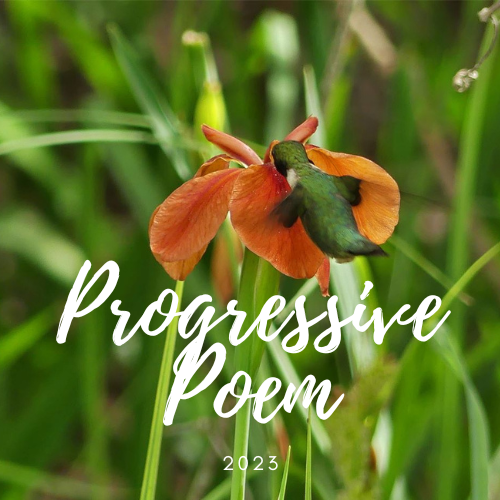
2023 Progressive Poem
April 1 Mary Lee Hahn, Another Year of Reading April 2 Heidi Mordhorst, My Juicy Little Universe April 3 Tabatha, The Opposite of Indifference April 4 Buffy Silverman April 5 Rose Cappelli, Imagine the Possibilities April 6 Donna Smith, Mainely Write April 7 Margaret Simon, Reflections on the Teche April 8 Leigh Anne, A Day in the Life April 9 Linda Mitchell, A Word Edgewise April 10 Denise Krebs, Dare to Care April 11 Emma Roller, Penguins and Poems April 12 Dave Roller, Leap Of Dave April 13 Irene Latham Live You Poem April 14 Janice Scully, Salt City Verse April 15 Jone Rush MacCulloch April 16 Linda Baie, TeacherDance April 17 Carol Varsalona, Beyond Literacy Link April 18 Marcie Atkins April 19 Carol Labuzzetta at The Apples in My Orchard April 20 Cathy Hutter, Poeturescapes April 21 Sarah Grace Tuttle, Sarah Grace Tuttle’s Blog, April 22 Marilyn Garcia April 23 Catherine, Reading to the Core April 24 Janet Fagal, hosted by Tabatha, The Opposite of Indifference April 25 Ruth, There is no Such Thing as a God-Forsaken Town April 26 Patricia J. Franz, Reverie April 27 Theresa Gaughan, Theresa’s Teaching Tidbits April 28 Karin Fisher-Golton, Still in Awe Blog April 29 Karen Eastlund, Karen’s Got a Blog April 30 Michelle Kogan Illustration, Painting, and Writing |
